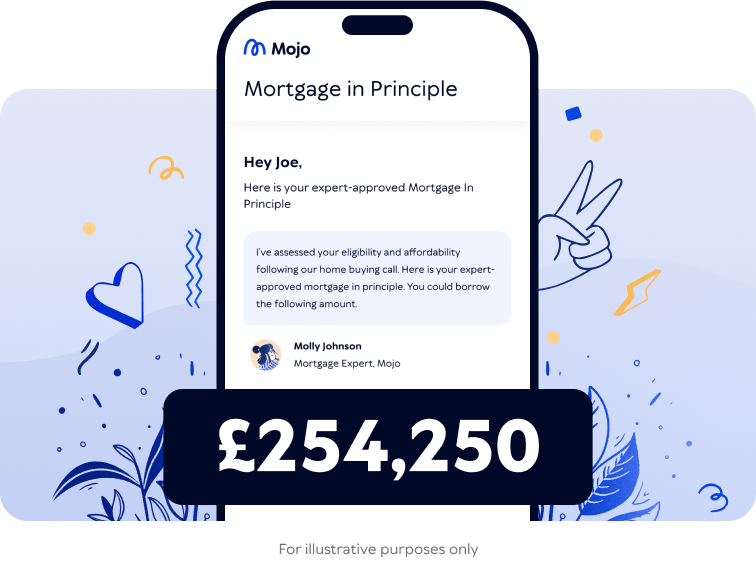How to win a property bidding war
House hunting can be a lot of fun… until you find the perfect home and another buyer swoops in with a better offer. But, don’t worry, another dream home could be just around the corner (literally).


8 ways to win a property bidding war
Here are our top tips to help you make a winning offer and secure your next home.
1. Show you mean business with a Mortgage in Principle
A mortgage in principle (MIP) is a document that indicates how much you might be able to borrow to buy a property. While it’s not a guarantee you’ll be able to get a mortgage for the same amount, it does show sellers and estate agents that you’re a serious buyer. This can put you in a great position if you’re up against other prospective buyers.
After all, if you were selling a property, would you rather sell to someone who a lender has already assessed versus someone who simply told you they could afford to buy your home?
2. Lead with your strongest offer
Keen to avoid a bidding war altogether? Offer your best price at the start. If someone goes higher, you’ll know it’s time to walk away. This can be less stressful than bidding in small increments, which can sometimes lead to buyers being tempted to go over their budget.
Note: If you are the only buyer interested in a property, it’s generally acceptable to offer 5-10% lower than the asking price. But we’re talking about bidding wars, here, so if you know there are other offers on the table then there’s often little room for negotiating below the asking price.
3. Don’t make an offer you can’t afford
This is, possibly, the most important tip to remember: set your buying budget, and stick to it.
It can be easy to get carried away when you’re competing against other buyers, but overpaying could cause problems later. Whether you struggle to get mortgage approval at valuation stage or regret stretching your finances too thin, it’s always worth ensuring you only pay what you can comfortably afford.
Unfortunately, 8% of first-time buyers do see their mortgage application rejected - even after successfully getting a MIP. So it’s important your house buying budget is realistic, and you’re financially ready before putting in an offer.
You should also make sure the price you’re offering is reasonable and realistic. Take a look at how much comparable homes have sold for in the local area or use Zoopla’s instant house valuation to give you an idea of the property’s value.
4. Bid an odd number
Offering a more precise figure is more likely to be accepted, according to psychological studies. Sellers might place more value on a specific number rather than a round number, which suggests you’ve chosen a figure from random rather than working out those numbers.
So, for example, instead of offering a nice neat £250,000, consider giving £250,500 a try instead.
Top tip: It’s worth adding on top of a precise figure rather than falling below it, just in case another buyer offers that nice round number.
5. Match the seller’s timeline
It’s not all about the money. Many sellers would love a stress-fee, straightforward process!
If you can, find out why and when they want to sell. This could help you to offer flexibility, which may well persuade the seller to choose you over other buyers who may have their own set timelines in mind.
For example, the seller might be keen for a quick sale or they might actually need extra time to move out and be looking for a more patient buyer. This is, again, where being chain-free can be advantageous as you won’t have any additional pressure from your own buyer to worry about.
6. Be responsive
Waiting around a week or two to put in an offer will likely see you lose out to another buyer who’s ready to make a quick decision. Of course, don’t rush into your decision, but don’t ghost the seller either. Poor communication is a big red flag. After all, this gives the seller an idea of what it’ll be like to deal with you throughout the process.
It’s also worth remembering that estate agents play a key role so, while they won’t be able to influence the sale, it can’t hurt to be polite and pleasant to deal with.
7. Sell yourself… but be realistic
Some homeowners may be more motivated to sell to a buyer they connect with. So, when providing your written offer to the estate agent, consider including a short note explaining your position and why you want to buy the house.
A word of warning, though. Overly emotional letters may feel manipulative, and are often unlikely to even make their way to the seller. Stick to the facts and highlight why you’d be a great, reliable buyer. For example, if you’re a first-time buyer or coming to the sale chain-free, make sure your seller knows about it!
8. Be a ready-to-go buyer
If you already own a home, you’ll have a better chance of having your offer accepted if it’s ‘sold subject to contract’, which means you already have a buyer lined up. It’s not unheard of for some buyers to sell up and move into rental accommodation before searching to improve their chances of securing their perfect home, though this comes with its own risks. Our guide on how to buy and sell at the same time goes into more detail.
If you’re a first-time buyer, you have a natural advantage here as you’re not part of a chain. Sellers love a smooth sale, and a chain-free buyer reduces the risk of delays or deals falling through.

“Keep house hunting even if you're in the middle of a bidding war. It’s so easy to become fixated on a great property being ‘the one’ which can lead to you going over budget to try and secure it. But there are plenty of other homes out there! You might find another property you like just as much, with less competition.”
Luke Butcher, Chief Revenue Officer
How often do houses go over the asking price?
It depends on the market, the area you’re buying in and the type of property you’re looking for. In 2020, more than a third of homes achieved their final price or above. More recently, buyer demand has decreased but momentum in the market is slowly gaining pace.
According to Zoopla, sellers are now offering the smallest level of discounting since July 2023 and it’s now becoming more common for prospective buyers to offer above the asking price to secure their dream home.

Get mortgage-offer ready with a Mojo MIP
Find out how much you could afford to help you narrow down your property search and show sellers you’re a serious buyer. Ready to get ahead of the competition?
FAQs
If you’ve found the right home for you, you’ll need to tell the seller’s estate agent how much you’re willing to pay for it. This can either be done verbally or in writing. Now’s a good time to tell them any key advantages of selecting you as the buyer, such as being chain-free.
The seller will then decide to accept, reject or negotiate your offer. If there are other buyers competing for the property, you may be asked to submit your best and final offer so the seller can make a decision.
If your final offer is accepted, the property is then ‘sold subject to contract’ and will likely be taken off the market. You should request a formal letter of acceptance from the estate agent, too. Now it’s time to instruct a conveyancer and start the mortgage application process!
An open bid is where all interest parties are aware of each other’s offers, which often leads to a competitive bidding process. A sealed bid keeps each offer confidential. All bids will then be opened at the same time and the highest offer will likely be selected.
Sealed bids are a popular choice if there’s a lot of interest in a property as they discourage lengthy and stressful bidding wars. It’s therefore a good idea to submit your best possible offer upfront as you might not get the opportunity to increase it later.
If you’ve set yourself a clear home buying budget, and the offers are now going over that budget, it’s probably a good time to walk away. Buying a property you can’t afford is likely to cause issues, whether it’s a problem to secure a high enough mortgage or simply a matter of stretching your finances in the long-term.
It’s also a good idea to walk away if you think the price of the property has been pushed above its market value. Overpaying could cause issues at the property valuation stage or you could lose money when trying to sell it in years to come.
It ultimately depends on how much you can afford and how much you want to buy the property.
However, it’s important not to over-estimate the property’s value or you could run into trouble once your lender carries out their property valuation. If they don’t think the property is worth what you’re buying for it, they might not lend you the funds you need.
Before putting in a higher offer, look at how much comparable properties have sold for to make sure the price seems reasonable.
Yes, though gazumping is more prevalent in England and Wales than in Scotland. Even if the seller has accepted your offer, it is possible that another buyer could swoop in and offer a higher price which your seller could legally accept. You could reduce the chance of this happening by asking the seller to take the property off the market once they’ve accepted your offer. If the property is no longer advertised, it’s less likely another buyer will ask to view it.
It’s also a good idea to move swiftly through the home buying process if you can, to avoid the seller looking for an alternative buyer. Having a mortgage broker on your side can help here. They’ll iron out any issues that come up, and will liaise with other third-parties such as your lender, estate agent or conveyancer to minimise any delays.
Some do, and some don’t. You likely won’t be told the exact figures on the table, but the estate agent may tell you roughly where you stand against other interested parties (for example, if your offer is a long way off being the highest).